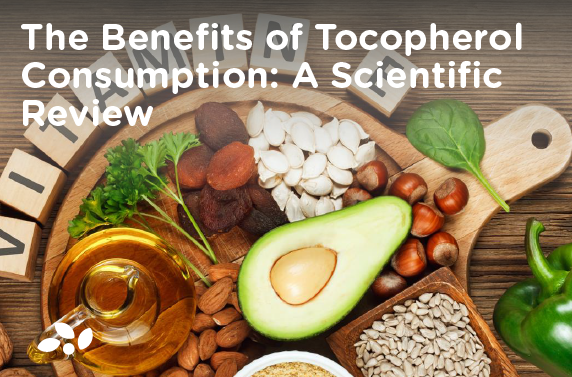Tocopherols, a form of vitamin E, are fat-soluble compounds that play a vital role in human health. These natural antioxidants are found in a variety of foods and are crucial in protecting cells against oxidative damage. This article reviews the benefits of tocopherol consumption in preventing chronic diseases, promoting cardiovascular health, supporting immune function, and other positive health effects.
Tocopherols are a class of chemical compounds belonging to the vitamin E group and are found in a variety of foods, especially in vegetable oils, nuts, seeds, and some leafy greens. Their antioxidant capacity makes them valuable for human health as they help protect cells and tissues in the body against oxidative stress and damage caused by free radicals. In this article, we will explore in detail the benefits of tocopherol consumption on health.
Potential Benefits of Tocopherol Consumption
- Protection Against Oxidative Stress: Oxidative stress is a biological process that occurs when there is an imbalance between the production of free radicals and the body’s ability to neutralize them with antioxidants. Tocopherols are fat-soluble antioxidants that can neutralize free radicals, thus preventing cellular damage and protecting against chronic diseases such as cancer and cardiovascular diseases.
- Cancer Prevention: Numerous studies have suggested that tocopherol consumption may be associated with a lower risk of developing certain types of cancer. The antioxidant capacity of these compounds can help prevent the formation of cancer cells by protecting DNA from mutations and oxidative damage. Tocopherols, particularly alpha-tocopherol, have been observed to have positive effects on the prevention of prostate, lung, breast, and colon cancer.
- Promotion of Cardiovascular Health: Tocopherols also play a significant role in cardiovascular health. They help prevent the oxidation of LDL cholesterol (“bad cholesterol”), reducing the risk of plaque formation in arteries and the development of heart diseases. Additionally, tocopherols can improve blood vessel function and help maintain blood pressure within healthy levels.
- Support of Immune Function: Vitamin E, including tocopherols, is essential for the optimal functioning of the immune system. These antioxidants help maintain the integrity of cell membranes, which is crucial for immune cell function. Furthermore, tocopherols have been observed to increase antibody production, strengthening the immune system’s response to infections and diseases.
- Skin Protection: Tocopherols may also have benefits for skin health. They are used in numerous skincare products due to their ability to protect the skin from UV radiation and other environmental factors. Moreover, they can help reduce skin dryness and inflammation, contributing to healthier and younger-looking skin.
- Improved Fertility: Some studies have suggested that tocopherols may play a role in improving fertility in both men and women. In men, they can protect sperm quality by preventing oxidative damage to sperm cells. In women, tocopherols have been observed to enhance egg health and may be beneficial for women seeking to conceive.
Recommended Intake
The recommended daily amount (RDA) of vitamin E for adults is approximately 15 milligrams of alpha-tocopherol. However, it is important to note that tocopherols work best in conjunction with other antioxidants such as vitamin C and selenium. Therefore, a balanced diet rich in natural antioxidant-rich foods is essential for maximizing benefits.
Conclusion
Tocopherols, a form of vitamin E, offer a range of health benefits for humans, ranging from protection against oxidative stress and cancer prevention to the promotion of cardiovascular health and support for immune function. These natural antioxidants are found in various foods and play an essential role in protecting cells against oxidative damage. Regular consumption of foods rich in tocopherols can be an effective strategy to improve health and prevent chronic diseases.
References:
Shahidi F, de Camargo AC. Tocopherols and Tocotrienols in Common and Emerging Dietary Sources: Occurrence, Applications, and Health Benefits. Int J Mol Sci. 2016 Oct 20;17(10):1745. doi: 10.3390/ijms17101745. PMID: 27775605; PMCID: PMC5085773.
Thompson MD, Cooney RV. The Potential Physiological Role of γ-Tocopherol in Human Health: A Qualitative Review. Nutr Cancer. 2020;72(5):808-825. doi: 10.1080/01635581.2019.1653472. Epub 2019 Aug 22. PMID: 31437022.
Szewczyk K, Chojnacka A, Górnicka M. Tocopherols and Tocotrienols-Bioactive Dietary Compounds; What Is Certain, What Is Doubt? Int J Mol Sci. 2021 Jun 9;22(12):6222. doi: 10.3390/ijms22126222. PMID: 34207571; PMCID: PMC8227182.
Azzi A. Tocopherols, tocotrienols and tocomonoenols: Many similar molecules but only one vitamin E. Redox Biol. 2019 Sep;26:101259. doi: 10.1016/j.redox.2019.101259. Epub 2019 Jun 19. PMID: 31254734; PMCID: PMC6604160.
Asbaghi O, Sadeghian M, Nazarian B, Sarreshtedari M, Mozaffari-Khosravi H, Maleki V, Alizadeh M, Shokri A, Sadeghi O. The effect of vitamin E supplementation on selected inflammatory biomarkers in adults: a systematic review and meta-analysis of randomized clinical trials. Sci Rep. 2020 Oct 14;10(1):17234. doi: 10.1038/s41598-020-73741-6. PMID: 33057114; PMCID: PMC7560744.



